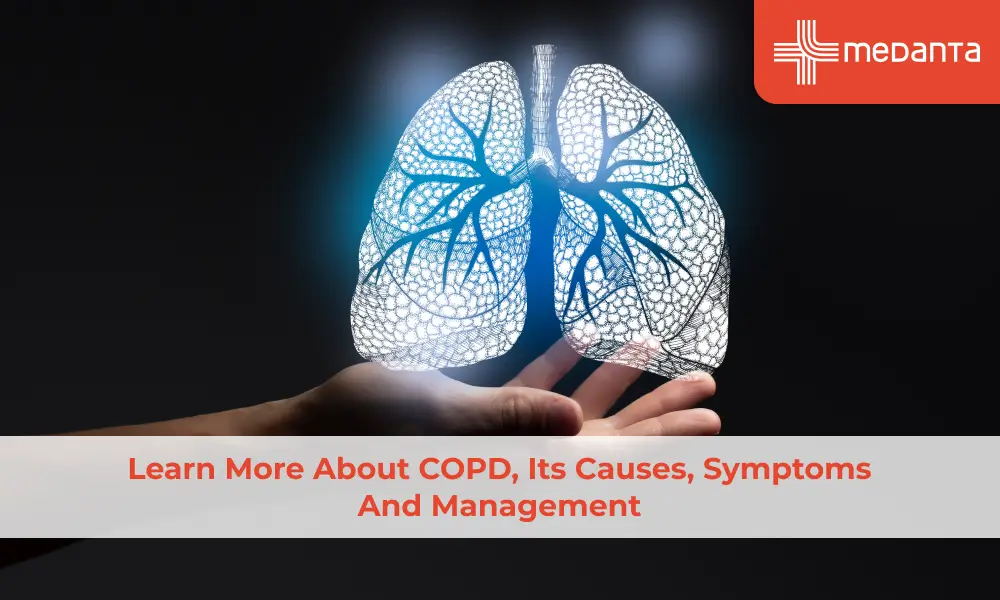Learn More About COPD, Its Causes, Symptoms And Management

TABLE OF CONTENTS
COPD stands for Chronic Obstructive Pulmonary Disease. Let us examine what this means. ‘Chronic’ means something that lasts a long time. ‘Obstructive’ in this context, means blocking of the airway tract. ‘Pulmonary’ means involving the lung and we all know what disease means. It is usually caused by inflammation - the way your body reacts to allergic or harmful substances. When this inflammation lasts a long time, it starts affecting our tissues themselves and they start changing.
Symptoms of COPD include difficulty in breathing, frequent cough, mucus or sputum production, and wheezing. This is usually caused by continued exposure to irritants like particulate matter, usually from cigarette smoke.
COPD is considered a factor in increasing the risk of developing heart disease, lung cancer and other health conditions. Chronic bronchitis and Emphysema are two conditions that are intrinsically linked to the development of COPD. Refractory asthma, which does not respond to normal asthma treatment is also under the umbrella of COPD, though less common.
What is Chronic bronchitis?
Chronic bronchitis refers to changes in the lining of your airway tubes, that carry air to the alveoli or air sacs (bronchial tubes), due to your body’s reaction to irritant substances. It is characterized by a daily cough with mucus production.
What is Emphysema?
Emphysema results when the air sacs (alveoli) in your lung get destroyed due to damage from exposure to irritants.
What are the risk factors that cause COPD?
COPD is caused by either the action of irritants on your airways or due to the function of your airways getting limited due to genetic or other conditions. The most common cause is irritants, especially smoking.
Smoking
Exposure to harmful chemicals or dust in the environment
A genetic condition called Alpha-1 Antitrypsin Deficiency
Air pollution
Passive inhalation of smoke
Chemicals, dust & fumes
Childhood respiratory infection
What are the signs and symptoms of COPD?
Shortness of breath
Wheezing
Tight feeling in the chest
Long-lasting cough with white, yellow or greenish sputum
Recurring infections
Low energy for daily activities
Weight loss
Swellings in the ankles, face or legs
Exacerbations are episodes when the symptoms get worse for a period of time.
What tests are done by the doctor to diagnose COPD?
Spirometry - A machine that measures how much air your lungs can hold and how fast you can breathe out
Chest Xrays - To rule out heart and lung problems (including Emphysema)
CT Scans to study surgical necessity or the presence of lung cancer
Arterial blood gas tests to study how well your lungs can exchange O2 and CO2
Lab tests to rule out Alpha-1 Antitrypsin Deficiency
How is COPD treated?
COPD is not completely treatable, but there are ways to ensure it does not keep getting worse:
Stopping smoking
Avoid exposure to passive smoke, chemicals or dust
Take medications as directed by your doctor
Light frequent exercise
Controlled coughing
Drink lots of water
Healthy diet
Steaming and humidifiers
Your doctor may recommend other treatments to help relieve the symptoms and slow down the disease like:
Bronchodilators
Corticosteroids
Combination inhalers
Antibiotics
A drug called Roflumilast prevents flare-up in chronic bronchitis
Flu & Pneumonia vaccines
Lung exercises and rehabilitation
Oxygen therapy
Surgery
In severe cases, the following may be suggested:
A surgery called a bullectomy is performed to remove large air sacs
Lung volume reduction surgery
Lung transplant
When should I seek immediate help?
If you have the following advanced symptoms, consult your doctor right away:
Severe shortness of breath
Difficulty in walking or talking
Fast heartbeats or irregular heartbeats
Blue colour of lips or nails
Breathing is fast and hard, even with medications





